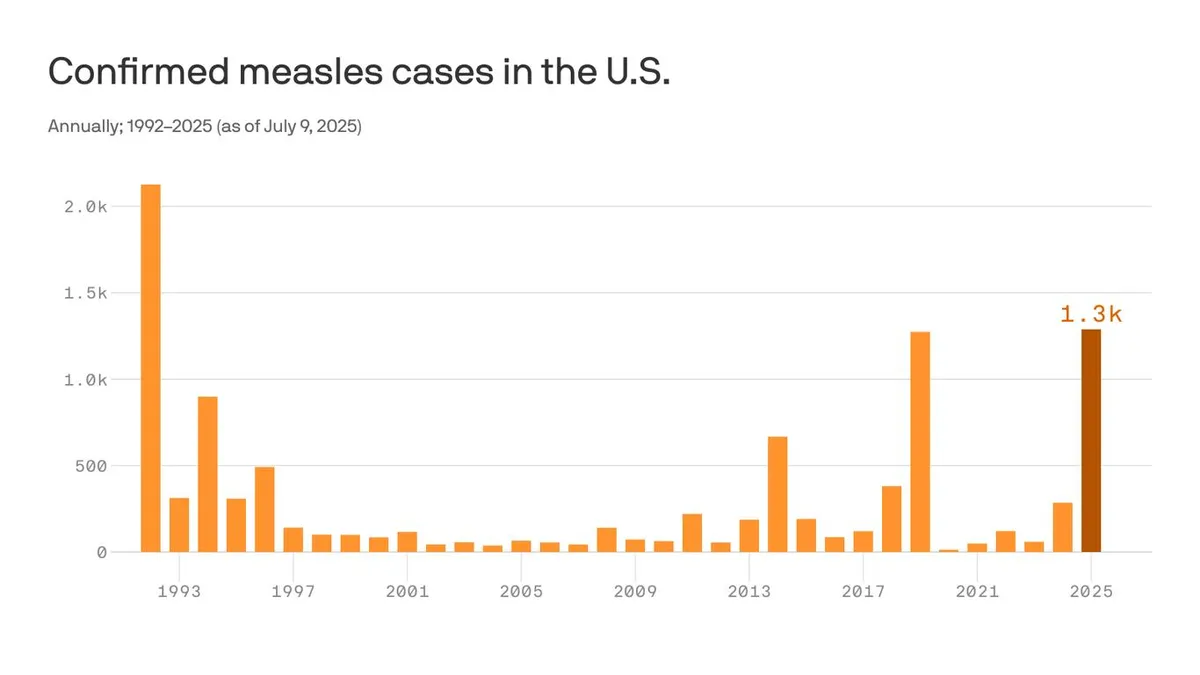
The latest report from the Centers for Disease Control and Prevention (CDC) reveals that the United States is experiencing a significant surge in measles cases, hitting a staggering 33-year high with 1,288 confirmed infections across 39 states as of July 8. This alarming statistic has already surpassed the highest annual case count since measles was declared eliminated in the year 2000.
The increase in measles cases is particularly concerning given the historical context. Although immunization campaigns have been effective in controlling the spread of this highly contagious virus, outbreaks have emerged in various regions, particularly in areas like West Texas. This rise can be attributed to low immunization rates and a high number of school exemptions, which has facilitated the spread of measles early in the year.
So far in 2023, there have been 27 reported outbreaks in the U.S., which account for a staggering 88% of the total measles cases. In contrast, the entire year of 2024 saw only 16 outbreaks, with 69% of cases linked to those incidents. Unfortunately, this year has also witnessed three confirmed deaths attributed to measles, with 13% of the affected individuals requiring hospitalization.
Among the 1,288 measles cases, a significant portion involved children: 368 cases (29%) were in children younger than 5, while 469 cases (36%) were among those aged 5 to 19 years. Disturbingly, 92% of these confirmed cases involved individuals who were either unvaccinated or whose vaccination status was unknown. Additionally, 4% of the cases were among individuals who had received only one dose of the measles, mumps, and rubella (MMR) vaccine, while another 4% had received the required two doses.
The drop in vaccination coverage among kindergartners is particularly alarming. Current statistics indicate that immunization rates have fallen below the herd immunity threshold of 95%, as reported by the CDC. The Partnership to Fight Infectious Disease has expressed concern that the current high case count highlights a troubling low point in the ongoing battle against vaccine-preventable diseases.
One major factor in this decline is the rise of misleading information regarding vaccine safety and efficacy, which has fostered skepticism about vaccinations among the public. This skepticism has led to a dangerous drop in immunization rates, creating an urgent need for renewed public health efforts.
The Health and Human Services Department has reiterated its commitment to supporting community efforts in managing the measles outbreaks. This support includes technical assistance, laboratory resources, and vaccine supplies as needed. While the overall risk of measles infection remains low for the general U.S. population, with a case rate of less than 0.4 per 100,000 individuals—lower than rates in Canada, the United Kingdom, France, Spain, and Italy—the CDC continues to stress the importance of the MMR vaccine as the best defense against measles.
Ultimately, the decision to vaccinate remains a personal choice. However, public health officials emphasize the collective responsibility to protect communities from vaccine-preventable diseases like measles.
Stay informed about the rising measles cases and the importance of vaccination to ensure the health and safety of our communities.